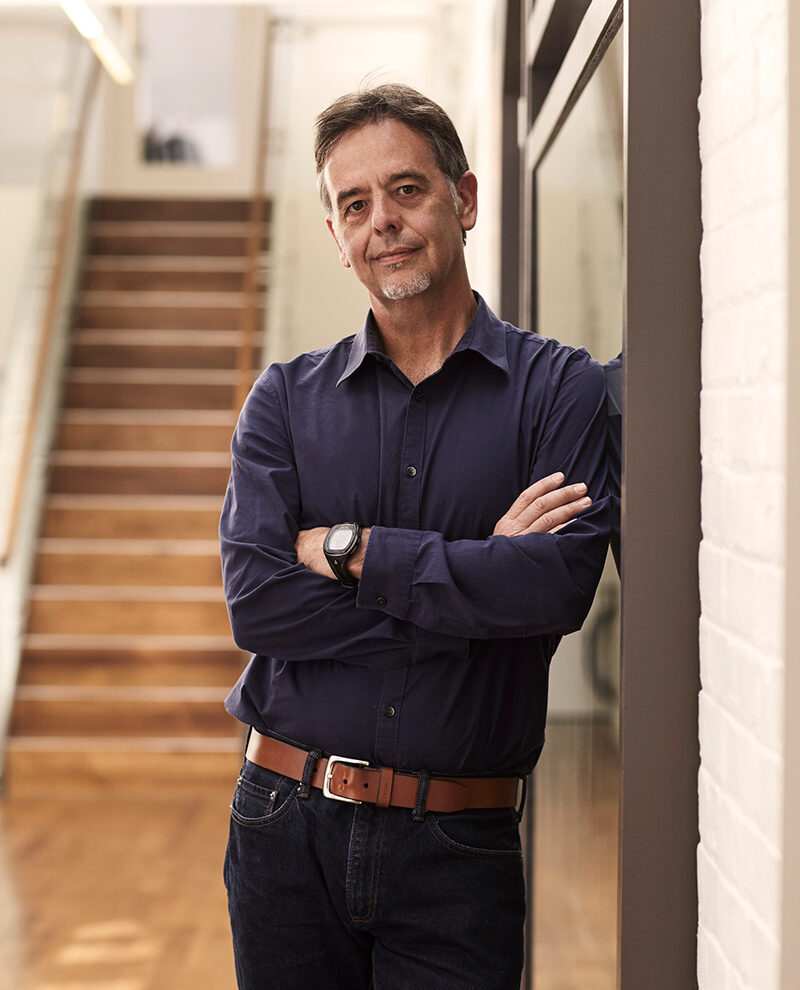Growing up, Professor Ron Deibert wanted to be a thief, not a thinker. He was born in a rough-and-tumble corner of east Vancouver in 1964, and his idea of a good time as a kid was to break into churches to wolf down communion wafers.
In time, the sacrilegious urge to break the law passed. But Deibert’s inclination to thumb his nose at authority never did. It began, Deibert says, when he attended a “dictatorial” Catholic primary school. He often made trouble by questioning the nuns and church dogma. “I thought it was all nonsense,” Deibert says. Sports and reading saved him from purgatory.
Later, he attended the University of British Columbia, where he meandered intellectually. He eventually earned a BA in 1988, after taking an eclectic menu of courses, studying everything from phys-ed to Soviet politics. But he was most happy dating, playing competitive hockey with the “dirty edge and intensity” of his hero, Philadelphia Flyer Bobby Clarke, and jamming in a reggae band.
Deibert had an epiphany while working the night shift as a grocery store clerk-cum-janitor. A co-worker, impressed by Deibert’s insatiable interest in current affairs, suggested he become an academic. “I was living my life to party,” Deibert says. “I didn’t want to do that [anymore].”
Deibert contemplated becoming a sports reporter, but his application to study journalism at community college was rejected. So he went back to the University of British Columbia to improve his GPA. Graduate studies in international relations at Queen’s University followed. “I was like a hermit I read voraciously,” Deibert recalls. A few years later, a chance encounter with a sympathetic professor helped him secure a place as a UBC doctoral student after he failed to land a spot on his first try. It was while wrestling with the focus of his dissertation that Deibert first recognized that information technology, particularly the nascent Internet, would revolutionize world politics and change his life.
He was right.
Doctorate in hand, Deibert made the short list for a teaching job at University of California, Berkeley, but he opted for U of T in 1996 because it had been the home of communications theorists Harold Innis and Marshall McLuhan. By the late 1990s, he was searching for a research vehicle to fuse his interest in world politics, the media, and information and communication technologies (ICTs).
Several ideas were percolating in Deibert’s mind when the Ford Foundation, an American non-profit organization, offered him a $250,000 grant to conduct research around ICTs and international security. The money, coupled with Deibert’s determination, led to the Citizen Lab’s birth in 2001.
One of Deibert’s Citizen Lab colleagues, Jane Gowan, also happens to be his live-in girlfriend. The university chums resurrected their relationship several years after Deibert’s wife succumbed to cancer. A graphic designer and member of the rock band Spygirls, Gowan says Deibert is motivated by a profound commitment to human rights. “At his core, there is a belief in freedom of speech,” she says. “He is someone who caused the world to look at the issue of Internet censorship more carefully.”
Recent Posts
People Worry That AI Will Replace Workers. But It Could Make Some More Productive
These scholars say artificial intelligence could help reduce income inequality
A Sentinel for Global Health
AI is promising a better – and faster – way to monitor the world for emerging medical threats
The Age of Deception
AI is generating a disinformation arms race. The window to stop it may be closing






One Response to “ The Troublemaker ”
It’s interesting to learn that the head of Citizen Lab once thought that “breaking into churches to wolf down communion wafers” was a way to have a good time. Perhaps it was only predictable that Ron Deibert often made trouble by questioning the nuns and Church dogma since he “thought it was all nonsense.” Thank goodness – or whatever force we should be thanking – that sports and reading saved him from purgatory!
I’m not sure whether the writer considers these stories to be chummy little anecdotes that will build empathy for Professor Deibert. Some people will consider the first reference sacrilegious. Many more would consider such behaviour a sure sign that he was never taught how to behave in church, or how to respect the beliefs of others. This is unfortunate, because his views on freedom of expression and his work in promoting it certainly sound very valuable, and important to the upholding of freedom of religious belief as well as freedom of expression.
Joanne McGarry
Executive Director
Catholic Civil Rights League
Toronto